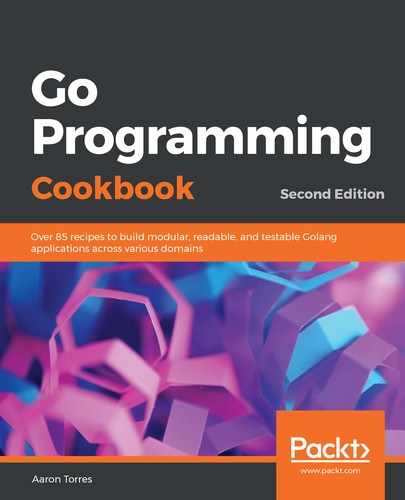The following steps cover how to write and run your application:
- From your Terminal/console application, create a new directory called ~/projects/go-programming-cookbook/chapter3/nulls.
- Navigate to this directory.
- Run the following command:
$ go mod init github.com/PacktPublishing/Go-Programming-Cookbook-Second-Edition/chapter3/nulls
You should see a file called go.mod that contains the following:
module github.com/PacktPublishing/Go-Programming-Cookbook-Second-Edition/chapter3/nulls
- Copy tests from ~/projects/go-programming-cookbook-original/chapter3/nulls or use this as an exercise to write some of your own code!
- Create a file called base.go with the following content:
package nulls
import (
"encoding/json"
"fmt"
)
// json that has name but not age
const (
jsonBlob = `{"name": "Aaron"}`
fulljsonBlob = `{"name":"Aaron", "age":0}`
)
// Example is a basic struct with age
// and name fields
type Example struct {
Age int `json:"age,omitempty"`
Name string `json:"name"`
}
// BaseEncoding shows encoding and
// decoding with normal types
func BaseEncoding() error {
e := Example{}
// note that no age = 0 age
if err := json.Unmarshal([]byte(jsonBlob), &e); err != nil
{
return err
}
fmt.Printf("Regular Unmarshal, no age: %+v ", e)
value, err := json.Marshal(&e)
if err != nil {
return err
}
fmt.Println("Regular Marshal, with no age:", string(value))
if err := json.Unmarshal([]byte(fulljsonBlob), &e);
err != nil {
return err
}
fmt.Printf("Regular Unmarshal, with age = 0: %+v ", e)
value, err = json.Marshal(&e)
if err != nil {
return err
}
fmt.Println("Regular Marshal, with age = 0:",
string(value))
return nil
}
- Create a file called pointer.go with the following content:
package nulls
import (
"encoding/json"
"fmt"
)
// ExamplePointer is the same, but
// uses a *Int
type ExamplePointer struct {
Age *int `json:"age,omitempty"`
Name string `json:"name"`
}
// PointerEncoding shows methods for
// dealing with nil/omitted values
func PointerEncoding() error {
// note that no age = nil age
e := ExamplePointer{}
if err := json.Unmarshal([]byte(jsonBlob), &e); err != nil
{
return err
}
fmt.Printf("Pointer Unmarshal, no age: %+v ", e)
value, err := json.Marshal(&e)
if err != nil {
return err
}
fmt.Println("Pointer Marshal, with no age:", string(value))
if err := json.Unmarshal([]byte(fulljsonBlob), &e);
err != nil {
return err
}
fmt.Printf("Pointer Unmarshal, with age = 0: %+v ", e)
value, err = json.Marshal(&e)
if err != nil {
return err
}
fmt.Println("Pointer Marshal, with age = 0:",
string(value))
return nil
}
- Create a file called nullencoding.go with the following content:
package nulls
import (
"database/sql"
"encoding/json"
"fmt"
)
type nullInt64 sql.NullInt64
// ExampleNullInt is the same, but
// uses a sql.NullInt64
type ExampleNullInt struct {
Age *nullInt64 `json:"age,omitempty"`
Name string `json:"name"`
}
func (v *nullInt64) MarshalJSON() ([]byte, error) {
if v.Valid {
return json.Marshal(v.Int64)
}
return json.Marshal(nil)
}
func (v *nullInt64) UnmarshalJSON(b []byte) error {
v.Valid = false
if b != nil {
v.Valid = true
return json.Unmarshal(b, &v.Int64)
}
return nil
}
// NullEncoding shows an alternative method
// for dealing with nil/omitted values
func NullEncoding() error {
e := ExampleNullInt{}
// note that no means an invalid value
if err := json.Unmarshal([]byte(jsonBlob), &e); err != nil
{
return err
}
fmt.Printf("nullInt64 Unmarshal, no age: %+v ", e)
value, err := json.Marshal(&e)
if err != nil {
return err
}
fmt.Println("nullInt64 Marshal, with no age:",
string(value))
if err := json.Unmarshal([]byte(fulljsonBlob), &e);
err != nil {
return err
}
fmt.Printf("nullInt64 Unmarshal, with age = 0: %+v ", e)
value, err = json.Marshal(&e)
if err != nil {
return err
}
fmt.Println("nullInt64 Marshal, with age = 0:",
string(value))
return nil
}
- Create a new directory named example and navigate to it.
- Create a file called main.go with the following content:
package main
import (
"fmt"
"github.com/PacktPublishing/
Go-Programming-Cookbook-Second-Edition/
chapter3/nulls"
)
func main() {
if err := nulls.BaseEncoding(); err != nil {
panic(err)
}
fmt.Println()
if err := nulls.PointerEncoding(); err != nil {
panic(err)
}
fmt.Println()
if err := nulls.NullEncoding(); err != nil {
panic(err)
}
}
- Run go run main.go. You could also run the following:
$ go build
$ ./example
You should see the following output:
$ go run main.go
Regular Unmarshal, no age: {Age:0 Name:Aaron}
Regular Marshal, with no age: {"name":"Aaron"}
Regular Unmarshal, with age = 0: {Age:0 Name:Aaron}
Regular Marshal, with age = 0: {"name":"Aaron"}
Pointer Unmarshal, no age: {Age:<nil> Name:Aaron}
Pointer Marshal, with no age: {"name":"Aaron"}
Pointer Unmarshal, with age = 0: {Age:0xc42000a610 Name:Aaron}
Pointer Marshal, with age = 0: {"age":0,"name":"Aaron"}
nullInt64 Unmarshal, no age: {Age:<nil> Name:Aaron}
nullInt64 Marshal, with no age: {"name":"Aaron"}
nullInt64 Unmarshal, with age = 0: {Age:0xc42000a750
Name:Aaron}
nullInt64 Marshal, with age = 0: {"age":0,"name":"Aaron"}
- If you copied or wrote your own tests, go up one directory and run go test. Ensure that all tests pass.
